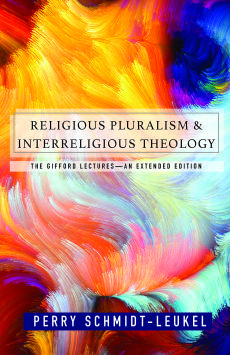Gifford Lectures published
Religious Studies Scholar Perry Schmidt-Leukel on “Religious Pluralism and Interreligious Theology”

The Gifford Lectures of Prof. Dr. Perry Schmidt-Leukel have now been published in an extended edition by Orbis Books, Maryknoll, New York as “Religious Pluralism and Interreligious Theology.” Schmidt-Leukel, an Anglican theologian, is Professor of Religious Studies and Intercultural Theology and a member of the Cluster of Excellence “Religion and Politics” at the University of Muenster. He gave the renowned Gifford Lectures at the University of Glasgow, Scotland, in 2015, as the first German Gifford lecturer after 25 years. As part of his lectures on “Interreligious Theology: The Future Shape of Theology” Schmidt-Leukel introduced a new theory about the structure of religious diversity. The invitation to the Gifford Lectures is regarded as one of the highest international academic distinctions in the philosophy of religion, theology and religious studies. The last German scholar who received this distinction was Annemarie Schimmel (1991-92). A Chinese and German translation of the published version of Schmidt-Leukel’s Gifford Lectures are under preparation.
In addition to his Gifford Lectures the book includes a lecture series which Perry Schmidt-Leukel gave in 2014 at the Zhejiang University of Hangzhou on pluralist approaches in the major world religions. In these two lecture series he summarizes the findings of his research at the Cluster of Excellence “Religion and Politics” since 2009 on the religions’ approaches to “religious pluralism” and, currently, on “interreligious theology” (project C2-16).
Paths of Salvations and their Complementarity
By “religious pluralism” Schmidt-Leukel refers to an attitude that understands other religions “as different, yet equally valid and often complementary paths of salvation.” “This view,” says Schmidt-Leukel, “has also significant political implications in as much as religious claims to unique or superior validity are often at the bottom of the religious potential for interreligious conflicts.” A theological implication of religious pluralism is, according to Schmidt-Leukel, that theology will become increasingly interreligious.
In the first part of the book the author discusses the development of pluralist positions within Christianity, Judaism, Islam, Hinduism, Buddhism and Chinese religions. “Once religions accept each other as, in a religious sense, equally valid, their theological reflection can no longer be confined to their own tradition,” says Schmidt-Leukel. Instead, it then becomes more or less imperative to do theology interreligiously, that is, to practice theology in the form of a joint interreligious discourse. This way of doing theology raises a number of methodological questions which are addressed in the second part of the book. The creative potential of interreligious theology is demonstrated by the author on the basis of concrete examples: an interreligious theology of three central creedal categories of “the Prophet,” “the Son of God,” and “the Buddha,” and by the example of a Buddhist-Christian theology of creation.
According to Professor Schmidt-Leukel the possibility of doing theology in an interreligious manner is fostered by a particular structural aspect of religious diversity which exhibits “fractal” features. That is, significant differences and contrast between the religions reappear at the level of inner-religious diversity. Inter-religious theology is therefore continuous with intra-religious, that is, ecumenical theology. “Religions are neither all the same, nor are they radically different. They resemble each other precisely in their internal diversity.” This insight, Schmidt-Leukel suggests, might become foundational for all future theology. The traditional theologies of the religions may further develop in this direction, that is, towards a form of theologizing or reflecting issues of faith that involves different denominational and religious perspectives in a perpetual productive exchange. (exc/ill)

